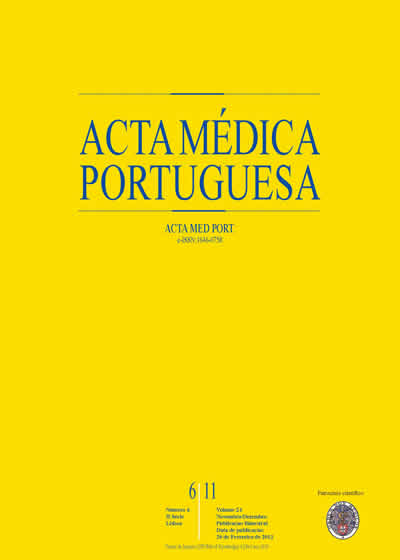Antibiotic treatment of uncomplicated cystitis in non-pregnant women up to menopause.
DOI:
https://doi.org/10.20344/amp.1413Abstract
To review treatment recommendations for UC in non-pregnant women up to menopause, using the scale Strength of Recommendation Taxonomy (SORT).Medline, UpToDate, Cochrane, Bandolier, Database of Abstracts of Reviews of Effects, National Guideline Clearinghouse, Guidelines Finder and the website of the Portuguese Urology Association.Research of systematic reviews (SR), meta-analyses (MA), randomized controlled trials (RCT) and guidelines, published in english and portuguese, between 2000 and 2008.Two MA, two SR, four RCT and six Guidelines were included. Three-day treatments are preferable to those of seven to ten days, mainly because of higher compliance and lower cost and incidence of adverse effects (A). Longer regimens are acceptable for bacterial eradication. Trimethoprim/sulfamethoxazole (TMP/SMX) is the option where resistance levels are lower than 10-20% (A). As a clinical and microbiological alternative, evidence seems to point out the Fluoroquinolones (FQ) (C) which are equally efficient among themselves, although showing different safety profiles.In case of allergy or high resistance to TMP/SMX, FQ are the most efficacious alternative, both prescriptions recommended for three days. However, due to the risk of worsening resistance to FQ, the options consist on nitrofurantoin and fosfomicine.Downloads
Downloads
Published
How to Cite
Issue
Section
License
All the articles published in the AMP are open access and comply with the requirements of funding agencies or academic institutions. The AMP is governed by the terms of the Creative Commons ‘Attribution – Non-Commercial Use - (CC-BY-NC)’ license, regarding the use by third parties.
It is the author’s responsibility to obtain approval for the reproduction of figures, tables, etc. from other publications.
Upon acceptance of an article for publication, the authors will be asked to complete the ICMJE “Copyright Liability and Copyright Sharing Statement “(http://www.actamedicaportuguesa.com/info/AMP-NormasPublicacao.pdf) and the “Declaration of Potential Conflicts of Interest” (http:// www.icmje.org/conflicts-of-interest). An e-mail will be sent to the corresponding author to acknowledge receipt of the manuscript.
After publication, the authors are authorised to make their articles available in repositories of their institutions of origin, as long as they always mention where they were published and according to the Creative Commons license.









